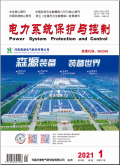电力系统保护与控制2024,Vol.52Issue(22):34-46,13.DOI:10.19783/j.cnki.pspc.246019
不同驾驶习惯下车用电池电流特征与容量衰退的关联性研究
Correlation between current characteristics and capacity decline for EV batteries under different driving habits
摘要
Abstract
A method for extracting the driving habit-specific features related to capacity degradation is proposed to address the issue of battery degradation variability in automotive lithium-ion batteries when the driving habits are different.The key factors affecting battery degradation under different driving habits are the different segmented acceleration processes and their proportions.A differential feature extraction method is designed.First,based on CLTC-P with a minimum time of 0.1 s and real vehicle test data,the driving habits are quantified by average speed and the proportion of the acceleration process,and the differences in the driving habits are analyzed.Then,the principal component analysis method is used to extract key influencing factors of the current,and the BI-KMEANS clustering method is employed to analyze pulse currents,combining the current differences under different driving habits to extract relevant features.Finally,the experiments are designed based on the differential features to explore their association with capacity degradation.The result shows that the different polarization times and intensities brought by different segmented acceleration processes are the main reasons for the variability in battery degradation when there are different driving habits.关键词
电动汽车/驾驶习惯/锂离子电池/电流特征/容量衰退Key words
electric vehicle/driving habits/lithium-ion battery/current characteristics/capacity decline引用本文复制引用
付智城,孙丙香,贾一鸣,龚敏明,马仕昌,庞俊峰..不同驾驶习惯下车用电池电流特征与容量衰退的关联性研究[J].电力系统保护与控制,2024,52(22):34-46,13.基金项目
This work is supported by the General Program of National Natural Science Foundation of China(No.52177206). 国家自然科学基金面上项目资助(52177206) (No.52177206)

